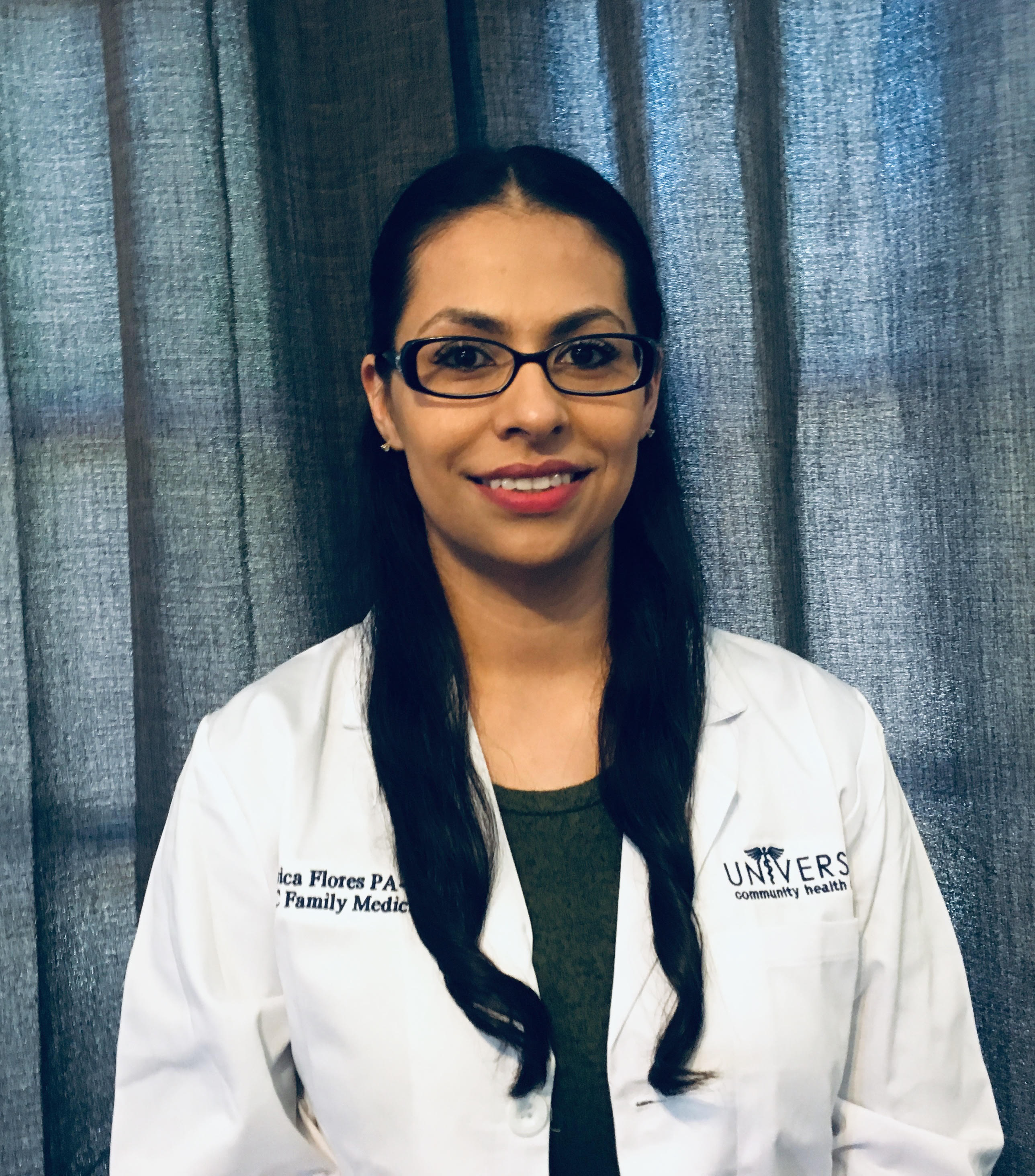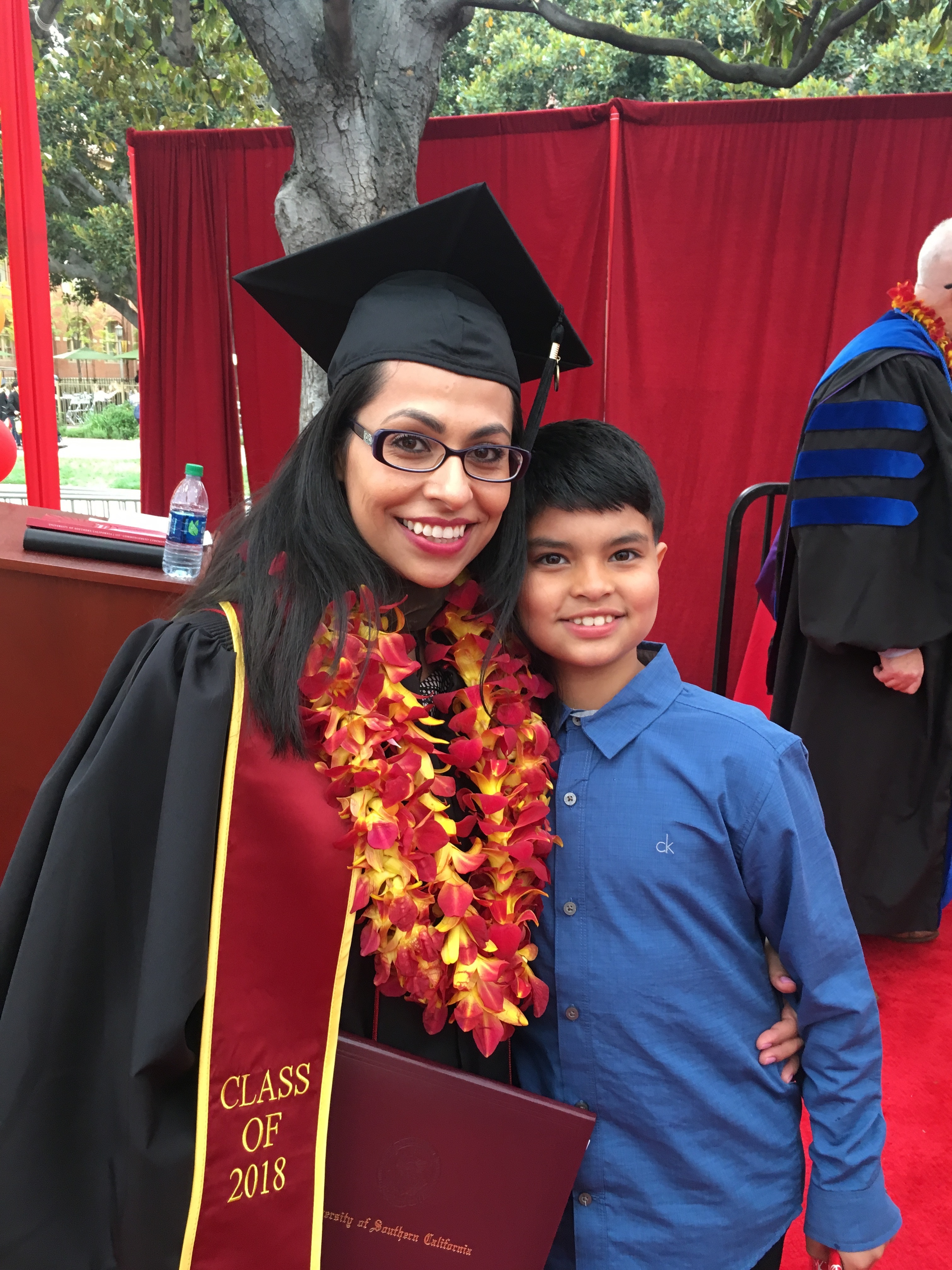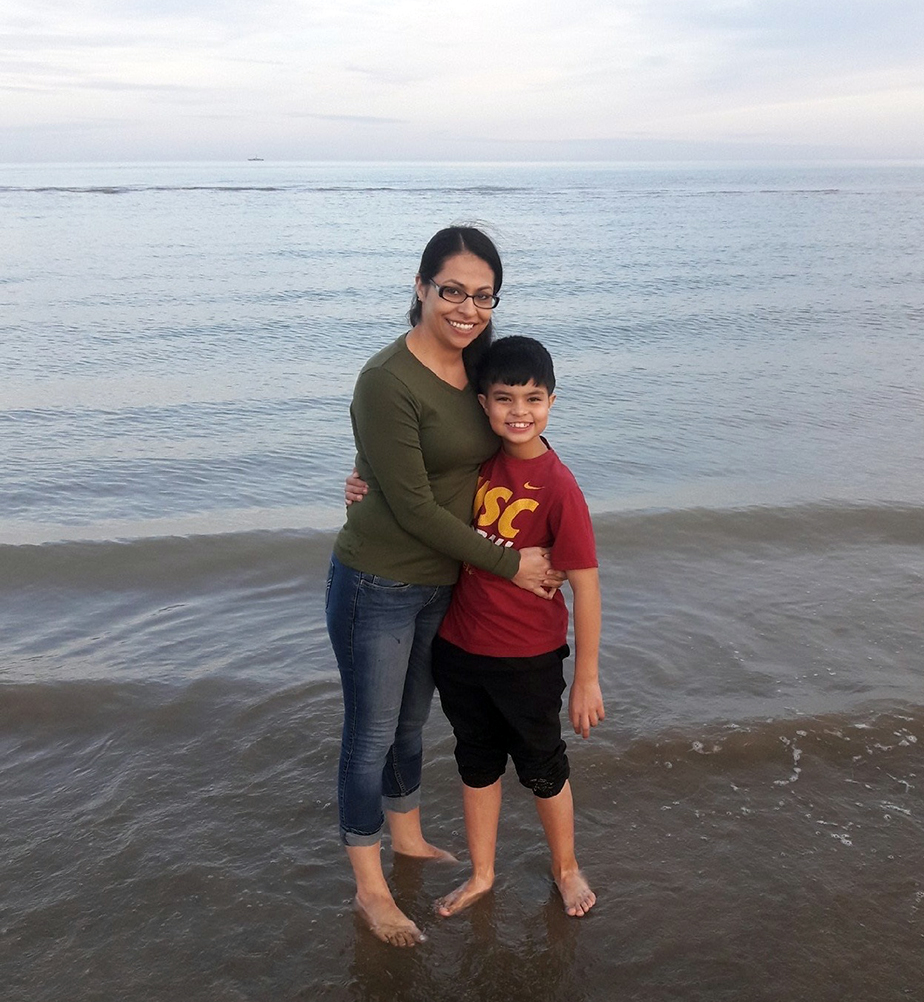Once an Interpreter, PA Now Serves Spanish-Speaking Population
Education and Communication Key to Minimizing Health Disparities
May 2, 2019
By Jennifer Walker

PA Jessica Flores has been an interpreter in medical settings at three key points in her life. When she was 13 years old, Flores, who speaks Spanish and English, began accompanying her father to appointments to help him communicate with his provider. Years later, when she was a medical assistant at a Los Angeles clinic, she was often an interpreter between some of the clinic’s Hispanic patients and one of the physicians. Then, while enrolled in the undergraduate program at California State University, Dominguez Hills, Flores volunteered at a hospital where she saw that many of the Hispanic patients were uninsured and using urgent care centers and the emergency room as their primary care provider; here, Flores also stepped in as an interpreter because “that’s what they needed,” she says.
These experiences led Flores to the work she does today as a PA providing care to a primarily Hispanic patient population at a clinic in downtown Los Angeles. On her lunch break, Flores talked to AAPA about helping her father during his medical appointments, attending a PA program as a single mom, and the importance of removing language barriers in healthcare settings.
[“Your PA Can” Ad Resources Now Available in Spanish]
Interpreting for Her Father
When Jessica Flores was growing up, her father, Rafael Flores, had regular appointments with his physician to treat his diabetes. These were routine visits where the provider would ask her father how he was feeling and whether he was taking his medications. But her dad often had questions or concerns, too, and the Spanish-speaking medical assistant, who was also the interpreter, didn’t relay those concerns to the physician.
At 13 years old, Flores, who is the oldest of four children, started accompanying her father to the physician’s office. There, she says, “I just saw my dad complaining and he needed to be heard. I started saying more, bringing [his concerns] to the doctor’s attention.” When she didn’t understand the medical terms, she researched them so she could explain them to her father.
Because Flores was there to help her father and his provider communicate, her father’s care plan changed. “He got referred to other specialists and some of his medications were removed or adjusted,” she says. “[That’s] just because of me explaining [things to him] or letting the provider know what his concerns were.”
Through this experience, Flores also developed her interest in medicine.

Attending a PA Program as a Single Mom
After high school, Flores completed two years of community college, then had her son, Daniel, in 2009, just before she was about to transfer to a university. She took a year off from school then returned when Daniel was one year old and Flores’ mother was able to care for him during the day.
Back then, Flores was in school to get her medical assistant (MA) degree. She worked for a year as a medical assistant at a clinic in Hawthorne in southwestern Los Angeles. It was here that one of the physicians would often ask Flores to interpret for her Hispanic patients; Flores, in turn, would ask the physician questions about medicine. Flores already knew she wanted to become a PA because of the flexibility the career provides, and one day she shared her goal with the physician. “I told her, ‘I’m just doing this for now, but I want to go back to school to be a provider,’” Flores says. “And she’s like, ‘What are you waiting for? Go!’ So that was more motivation [to continue my education].”
After graduating with an undergraduate degree in cellular and molecular biology, Flores enrolled in the PA program at the University of Southern California Keck School of Medicine (USC). Flores chose USC, in part, because of the school’s Spanish language prerequisite requirement that every new student must have studied the language for one year. “Being a Hispanic myself and having to deal with interpreting for my father, I saw that [understanding] the Spanish [language] is very important to get the message across and give the patient a better quality of care,” she says.
[PA Moms Blog Through School and Practice]
While she was in the PA program, Flores says she had her parents’“400 percent support” support, and they offered to take care of Daniel while she focused on studying. At first, Flores spent many hours at USC and came home late, after her son was in bed. Then Daniel began acting out at school and not doing his homework. Flores changed her schedule so she could come home earlier, help Daniel with his homework, and spend time with him, then continue studying at night. “He’s a great son; we talk a lot; he understands,” she says. “It was definitely a challenge, but it’s doable.”
For other parents considering a PA program, Flores says a support system and time management skills are necessary. She also suggests talking to kids about why mom or dad is going to school. “Make sure they understand what you’re doing, what it is for, and how it is going to benefit them and the whole family in the long run,” she says.

Removing Language Barriers
After graduating from USC in May 2018 and working briefly at a clinic in Wilmington, Flores began practicing at the downtown Los Angeles clinic. Here, she treats patients who primarily have diabetes or high blood pressure, or ailments like broken ankles or rashes. She estimates that she speaks Spanish with her patients about 90 percent of the time.
In the United States, about 25 percent of the Spanish-speaking population speaks English “not well” or “not at all,” according to the 2017 U.S. Census American Community Survey. For this population, having access to adequate language services in medical settings leads to improved patient experiences and better health outcomes, according to the 2016 study “The ‘Battle’ of Managing Language Barriers in Health Care.” It is ideal for these patients to have a provider who either speaks Spanish or who has access to an interpreter. Providers should also have some basic literature available in Spanish and, if they don’t speak the language, could consider learning a few basic Spanish words to help facilitate communication, Flores says.
“Understanding a foreign culture and language is important in the practice of medicine particularly when serving an underserved majority,” she says. “I believe education and communication are the keys to help minimize health disparities and improve the quality of life for these communities.”
Read More
2019 PA of the Year ‘Lives to Serve’ New Mexico Rural Communities
Changing Careers and Cross-State Commutes: Julie Torres’s PA Student Journey
Jennifer Walker is a freelance writer in Baltimore, MD. Contact Jennifer at [email protected].
Thank you for reading AAPA’s News Central
You have 2 articles left this month. Create a free account to read more stories, or become a member for more access to exclusive benefits! Already have an account? Log in.



